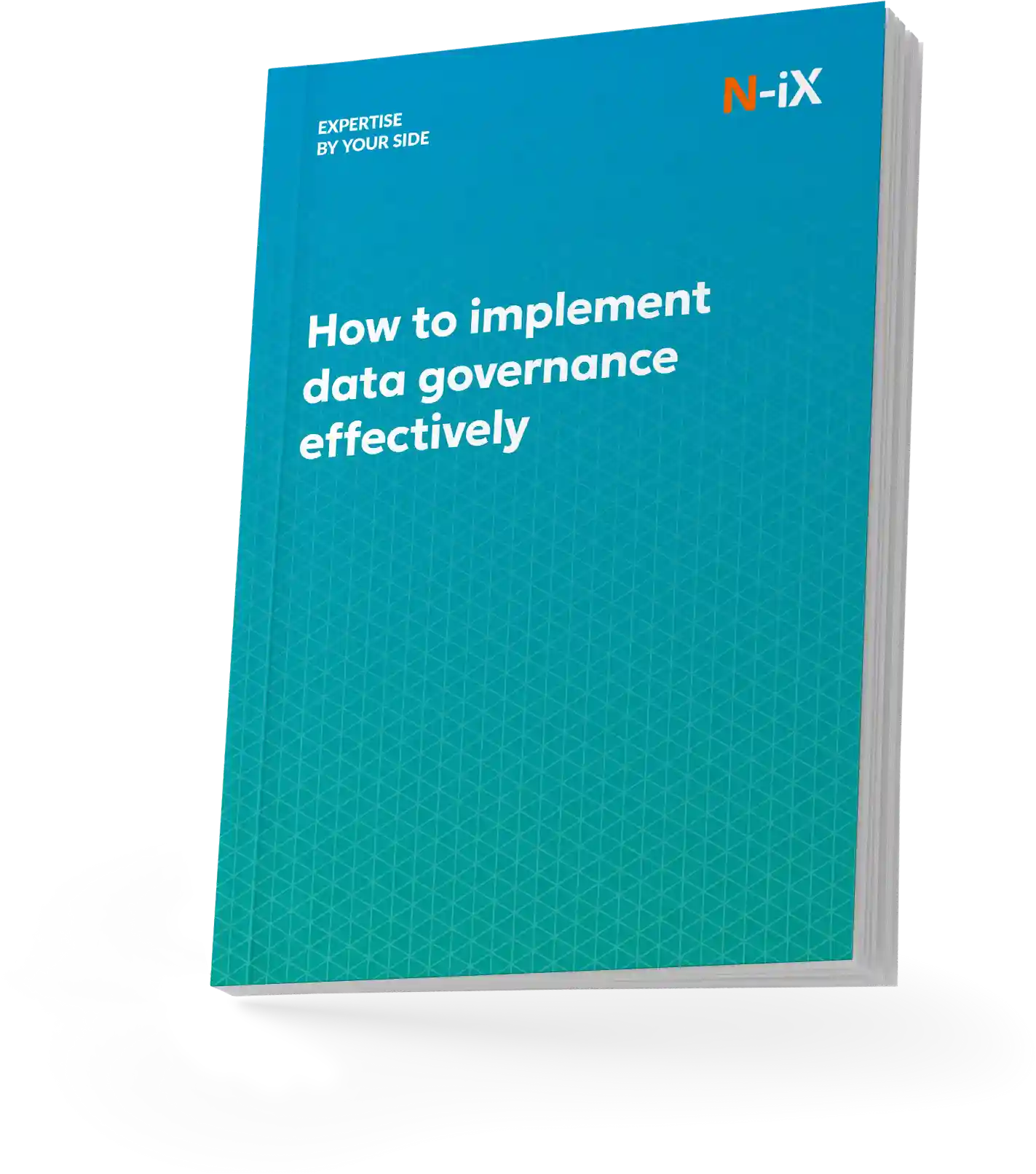The more health data your organization collects, the harder it becomes to manage it for measurable business and clinical value. That limits your ability to optimize operations, improve outcomes, or identify new revenue opportunities.
Data monetization in healthcare represents a structured, compliant way to reverse that imbalance, using your existing data to improve decisions, create new revenue streams, and enhance patient trust without compromising ethics or regulation. Whether applied to improving operational efficiency, enhancing care coordination, or forming data-driven partnerships with research and life sciences organizations, it enables healthcare enterprises to generate sustainable financial returns.
Leading healthcare organizations are already proving that it works. In this article, we'll discover the impact of healthcare data monetization at enterprises. If your organization is exploring how to make its data generate revenue, consider partnering with N-iX for expert data monetization consulting.
Why does the healthcare industry need to monetize data in 2026?
The transition toward patient-centric, data-driven healthcare solutions could generate up to $550B in cost savings in the US, according to current projections [1]. Monetization allows these savings to be captured systematically and reinvested in innovation and patient care. Let's look at the key areas where data monetization delivers the most tangible impact for healthcare organizations:
- What if healthcare could achieve financial stability without increasing costs? Monetizing existing data assets enables new revenue streams through analytics partnerships, research collaborations, and Data-as-a-Service models while maintaining cost control.
- If every clinical and operational decision were informed by real-time insights, how much waste could be avoided? Data monetization supports predictive maintenance, accurate demand forecasting, and efficient workforce planning, directly improving resource utilization and lowering operational expenses.
- Why does data-driven care deliver better outcomes? Integrated and governed datasets enable precision medicine, early detection, and proactive treatment, reducing the cost and complexity of care delivery.
- Could care quality improve if clinicians had access to accurate, standardized data? A monetized, well-managed data environment enhances clinical decision support, reduces diagnostic errors, and improves facility adherence to evidence-based practices.
- What if data could guide the next stage of healthcare innovation? Monetized data facilitates AI, digital twin technologies, and advanced analytics. It lays the foundation for scalable research, automation, and smarter population health management.
Which healthcare data can be monetized?
Let's explore the core data domains where monetization creates profits and how compliance and technology make it possible.
Clinical data
Clinical data sits at the core of healthcare's value ecosystem. Electronic health records, imaging results, laboratory data, and clinical trial outcomes are the foundation for diagnostics, research, and care optimization. Nearly 90% of insurers already rely on EHR data [3], and it's projected to remain the largest monetized data segment globally, but only when fully anonymized, standardized, and governed under strict privacy regulations.
Before being shared or commercialized, all clinical datasets must undergo rigorous de-identification and anonymization to comply with HIPAA, GDPR, and regional health data protection frameworks. Properly anonymized clinical data supports AI-driven predictive models, population health analytics, and external research partnerships without exposing patient identities.
Genomic and molecular data
Few data types carry more commercial potential than genomics. Combined with phenotypic and clinical data, genomic datasets present drug discovery and precision therapeutics breakthrough opportunities. In certain research partnerships, linked genomic records have been valued at several thousand pounds per patient due to their uniqueness and relevance to high-stakes R&D.
Real-world evidence and claims data
Real-world evidence derived from insurance claims, prescriptions, and treatment histories has become indispensable to pharmaceutical and payer ecosystems. It enables companies to assess drug efficacy, optimize reimbursement, and demonstrate compliance with regulatory outcomes.
Patient-generated health data
Wearables, home monitoring devices, and mobile health apps generate continuous streams of information that capture real-time patient behavior. This data supports preventive care, adherence tracking, and early risk identification. When collected transparently and used with consent, it enriches the clinical picture, enhances personalization, and opens opportunities for collaboration with payers and digital health innovators.
Operational and administrative data
Behind every healthcare operation hides a vast network of workflows and transactions from billing and scheduling to supply chain and workforce management. Monetizing these datasets suggests using them to achieve measurable efficiency and cost reduction. Data-driven optimization of resource allocation, claims management, and logistics can reduce operating costs by up to 5% annually while improving service delivery [4].
Operational and administrative data can also become a direct source of measurable financial value. In one of our recent projects, N-iX partnered with a leading US healthcare provider to modernize its legacy data infrastructure and migrate large volumes of EMR and operational data to Google Cloud Platform. The new data ecosystem unified siloed datasets across clinical and administrative domains for advanced analytics, real-time insights, and secure data exchange.
Implement data governance the right way—find out how!


Success!

Synthetic and hyper-synthetic data
Synthetic data is one of the safest and most scalable assets for monetization. It replicates the statistical characteristics of real data without exposing personal information, enabling organizations to train AI models, test algorithms, and conduct simulations at scale. By 2028, synthetic data is expected to account for roughly 80% of the data used in AI applications [2].
|
Data type |
Main value |
Compliance requirement |
Monetization example |
|
Clinical data |
Research, diagnostics |
Requires anonymization |
AI-driven outcome models |
|
Genomic data |
Drug discovery |
Multi-party consent |
Precision therapeutics |
|
Real-world evidence data |
Reimbursement insights |
HIPAA/GDPR safe |
Market access analytics |
|
Patient-generated data |
Preventive care |
Consent dashboards |
Wearable data services |
|
Synthetic data |
Safe AI training |
None (no PHI) |
Simulation & testing |
Smart ways to monetize healthcare data
Healthcare data monetization encompasses two complementary approaches: direct monetization, which generates external revenue through data sales, licensing, or partnerships; and indirect monetization, which drives internal performance, cost efficiency, and innovation. In practice, both operate along a continuum: the same dataset that powers predictive analytics internally can, when properly governed, create new revenue opportunities externally.
Let's look at the most effective and forward-looking healthcare data monetization strategies organizations use in 2026.

Data-as-a-Service
The Data-as-a-Service model enables healthcare organizations to monetize aggregated, standardized, and de-identified data by providing external stakeholders access through controlled, subscription-based, or on-demand channels. It is among the most established and scalable approaches to data monetization. The DaaS model depends on data quality, standardization, and interoperability. Hospitals, diagnostic networks, and payers can consolidate clinical, claims, or diagnostic information into structured datasets and provide them securely to research institutions, life sciences companies, and analytics vendors.
Common outcomes include enabling real-world evidence studies, improving population health models, and supporting comparative effectiveness research. One of healthcare data monetization examples is an anonymized treatment and outcomes data that can help accelerate drug development pipelines. At the same time, aggregated claims data can reveal national-level patterns in chronic disease management.
Insight-as-a-Service and advanced analytics
Beyond selling data itself, many organizations now commercialize the insights derived from it. Healthcare providers can offer external partners access to predictive models, disease risk scores, or benchmarking dashboards by applying advanced analytics, AI, and Machine Learning.
Insight-as-a-Service monetizes the intelligence derived from data. Instead of sharing raw datasets, healthcare organizations apply AI and analytics to generate specific insights, predictive models, or decision-support tools and then provide access to those outputs through APIs, dashboards, or reports. This model has gained traction because it reduces privacy risk while delivering high commercial and operational value. The data never leaves the secure environment; stakeholders access the processed insights.
For example, a healthcare provider can develop a predictive model using internal electronic health records to forecast patient outcomes and license that model to payer networks or research entities. Similarly, a data consortium can provide benchmarking analytics that help hospitals compare operational efficiency or treatment outcomes across regions.
Read also: How to build an effective data monetization strategy
Data marketplaces and secure exchanges
Data marketplaces and secure exchange platforms allow healthcare entities to publish, distribute, and transact on governed datasets in a transparent environment. These platforms facilitate controlled access to anonymized or pseudonymized data and ensure full auditability of every transaction.
Through marketplaces, health systems, or payers can list curated data assets for authorized buyers, including life sciences organizations or research groups. Access can be structured through tiered permissions, smart contracts, or privacy-preserving technologies like federated learning. In parallel, patient-mediated exchange models are advancing, where individuals retain control over their health data and grant consent for specific uses in research or product development.
Strategic data partnerships and ecosystem collaborations
Collaborative data partnerships are becoming the core of sustainable healthcare data monetization. Instead of transactional exchanges, organizations form multi-stakeholder ecosystems that co-develop insights, share results, and distribute financial or operational benefits. In these partnerships, hospitals, payers, technology vendors, and research institutions jointly contribute complementary datasets to develop analytical models or new services.
For instance, a payer and provider may integrate de-identified claims and outcomes data to identify cost drivers, improve care coordination, and optimize reimbursement strategies. Similarly, cross-sector partnerships can accelerate clinical trial recruitment or inform precision medicine initiatives through securely shared datasets.
Operational optimization
Not all monetization requires external transactions. Operational optimization represents indirect data monetization. It involves applying analytics, automation, and AI to enhance efficiency, reduce waste, and make better-informed organizational decisions.
Healthcare systems manage enormous complexity from resource allocation and workforce scheduling to supply chain and claims management. Data-driven optimization enables hospitals and payers to model capacity, predict demand, and adjust resource distribution dynamically. Predictive analytics can forecast patient volumes, aligning staffing and equipment use with real-time needs.
Analytics-enabled platforms
Analytics-enabled platforms belong to a more advanced stage of data monetization. These cloud-based or hybrid platforms consolidate internal and external datasets, offering tools for predictive analytics, visualization, and ML that can be used internally or extended to partners as managed services.
Within healthcare, these platforms support a range of mission-critical applications (population health management and predictive maintenance of medical devices to real-time clinical decision support). The most successful implementations integrate seamlessly with existing systems, embedding intelligence directly into clinical workflows, supply chain operations, and administrative platforms. In another engagement, N-iX partnered with a global clinical research organization to modernize its digital ecosystem for clinical trial data management. Our team consolidated fragmented data sources, improved interoperability, and built analytics capabilities that accelerated insight generation and reporting.
Personalized and predictive healthcare services
Data-driven personalization can deliver precision-tailored treatments, early interventions, and proactive disease management that directly translate into better outcomes and optimized costs.
Predictive models enable healthcare providers to
- Anticipate disease progression, stratify patient risk, and tailor resource allocation,
- Obtain more accurate risk modeling and reduce claims volatility,
- Gain fewer readmissions, higher adherence rates,
- Improve performance-based reimbursement measurably.
These capabilities also open the door to new service-based revenue models, such as subscription-based wellness programs, remote monitoring services, or digital therapeutics leveraging continuous wearables and sensor data.
Data-driven research
Healthcare organizations increasingly leverage their data assets to accelerate research and innovation. Aggregated electronic health records, imaging archives, and real-world evidence datasets are essential for advancing clinical studies, drug discovery, and public health analytics.
When structured and governed effectively, internal research data ecosystems can generate insights that reduce trial timelines, improve protocol design, and identify potential therapeutic targets. They also enable new collaborations between providers, academia, and life sciences partners under controlled data-sharing frameworks that ensure privacy and compliance.
These innovations do more than enhance revenue; they position organizations as active contributors to scientific progress. Monetization comes through accelerated innovation, reputational value, and shared breakthroughs that feed back into clinical and commercial ecosystems.
What are the risks of healthcare data monetization?
The data monetization in healthcare offers organizations new sources of innovation, insight, and revenue, but it also exposes them to a complex range of risks. Unlike other industries, healthcare operates under strict governance, where each misstep in data handling can translate into reputational and legal consequences.
Below are the major categories of risks that healthcare organizations must address when designing and executing data monetization strategies.
Regulatory and compliance risks
The most immediate and far-reaching constraint is regulatory compliance. Healthcare operates within one of the most complex legal environments globally, where the margin for error is nearly nonexistent. Regulations such as the Health Insurance Portability and Accountability Act (HIPAA) in the US, GDPR in the European Union, and region-specific data protection laws strictly govern how personal health information is collected, stored, and shared.
Compliance is challenging because regulatory guidance has not fully caught up with the realities of the modern data economy. The rapid adoption of AI, predictive analytics, and cross-border data flows often pushes beyond what existing rules anticipate. Even when organizations use de-identified data, the risk of regulatory scrutiny remains high.
Data security threats
Even when organizations comply with regulations, the security dimension poses constant risk. Healthcare data is a sensitive and lucrative target for ransomware and extortion attacks. Large-scale incidents demonstrate the ripple effect of such breaches. A single ransomware attack can shut down clinical operations across networks, delay treatments, and expose hundreds of thousands of records. The resulting lawsuits, regulatory inquiries, and remediation costs can erase years of investment. For this reason, security investment has become a prerequisite for monetization readiness.

Ethical concerns
If compliance defines the rules, ethics defines the reputation. Monetization that lacks transparency or fairness quickly harms public trust, and once lost, it is almost impossible to rebuild.
Patients expect clarity on how their data is used, who benefits, and what safeguards exist. Any ambiguity can be perceived as exploitation, especially when monetization involves genomic, behavioral, or social determinants of health data. The question of ownership remains unresolved: while patients are the original data source, financial returns typically accrue to providers, payers, or intermediaries.
How N-iX helps healthcare organizations manage and prevent these risks
We approach healthcare data monetization as a technical and ethical transformation that requires secure architecture, compliant governance, and deep industry understanding. Our teams combine data engineering, AI, and healthcare compliance expertise to help organizations capture value from their data while maintaining the highest trust and safety standards.
We mitigate the key risks of data monetization in healthcare by:
- Implementing HIPAA- and GDPR-compliant data architectures: designing secure data pipelines with end-to-end encryption, pseudonymization of PHI, fine-grained access controls, and region-specific data residency management.
- De-identifying and anonymizing data before exchange: systematically removing personally identifiable information and applying privacy-enhancing technologies such as differential privacy and encryption-at-rest.
- Establishing enterprise-grade data governance frameworks: defining clear data ownership, access policies, lineage tracking, and automated compliance reporting.
- Integrating privacy-enhancing technologies: deploying differential privacy, federated learning, and synthetic data generation to enable safe data sharing and AI model training.
- Ensuring algorithmic transparency and fairness: implementing model AI explainability tools and fairness audits to detect bias in predictive models.
- Modernizing legacy systems for interoperability: integrating disparate EHRs, lab systems, and claims databases using HL7/FHIR standards to create unified, high-quality datasets.
- Deploying secure and auditable data exchange platforms: building permissioned, often blockchain-based, environments that enable verified data sharing, controlled access, and immutable audit trails.
- Integrating data clean rooms and privacy sandboxes: enabling multiple entities to collaborate on analytics and AI initiatives using shared, privacy-controlled environments.
Wrapping up
The future of healthcare data monetization will belong to organizations that understand a simple truth: data is powerful only when trusted. Monetization isn't about trading information; it's about engineering integrity into every byte so that insights can create both economic and social value.
If your organization is exploring how to generate new revenue streams, enhance operational performance, or accelerate innovation through data, let's make it happen responsibly. N-iX helps healthcare providers, payers, and life sciences organizations design secure, compliant, and profitable data ecosystems that turn insight into impact.
FAQ
What is healthcare data monetization?
Healthcare data monetization is the process of generating measurable economic or operational value from medical, administrative, and patient data. It can include direct revenue through partnerships or data licensing and indirect gains through improved efficiency, clinical insights, and better decision-making.
How do hospitals monetize data safely?
Hospitals monetize data safely by implementing strict data governance, anonymization, and compliance frameworks such as HIPAA in the US and GDPR in the EU. They share only de-identified or aggregated datasets with trusted research or technology partners, often using secure platforms like data clean rooms.
Is it legal to sell or share healthcare data?
Yes, but only under specific conditions. Selling or sharing healthcare data is legal if the information is anonymized correctly, consent has been obtained when required, and the transaction complies with relevant privacy laws and ethical standards. Organizations must document every data-sharing agreement and ensure transparency with regulators and patients.
Is healthcare data monetization legal and ethical?
Data monetization is legal and ethical when conducted transparently, with patient consent and strong privacy safeguards in place. Ethical monetization frameworks prioritize patient trust, prevent re-identification, and ensure data use contributes to medical research, innovation, or system improvement.
What technologies support data monetization in healthcare?
Key technologies include cloud data platforms, AI and machine learning, blockchain, synthetic data generation, and privacy-preserving computation tools such as federated learning or data clean rooms. These technologies enable secure, scalable, and compliant data exchange while ensuring accuracy, transparency, and patient privacy.
Reference
- Healthcare: Weathering the storm - McKinsey
- The future of data is fake - Synthetic data is the new reality - Gartner
- Healthcare data monetization market size and share analysis - Coherent market insight
- The impact of a lifestyle behaviour change program on healthcare costs - Elena Agachi, Jochen O. Mierau
Have a question?
Speak to an expert





